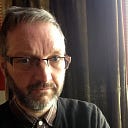‘I Will Begin Again…’
‘Under a blood-red sky
A crowd has gathered in black and white
Arms entwined, the chosen few
The newspaper says… it’s true, it’s true…’
U2’s ‘New Year’s Day’, released in January 1983, finding hope in the story of Polish trade union’s Solidarity movement. Finding hope ever since.
I must have heard that bass line and those piano chords for the first time at London’s Lyceum Ballroom in December 1982 and there they were again in Mumbai, the last time the band played live, in that long-distant pre-pandemic world.
New Year’s Day. The promise of a new start. ‘I will begin again…’
The first of January, from Janus, deity with two faces, one for looking back, one for looking forward. The god of transitions, the one who was ‘going forward’ before it became a cliché.
How to begin again.
The word ‘calendar’ is rooted in the word ‘calare’ which means ‘to call out’, which is what you did when you first saw the new moon. Here she is now!
Punctuation in the heavens. A way to stop and to start, to lie down and to rise again.
Annie Dillard, peerless chronicler of the natural world, says that a schedule defends us from chaos and whim. She calls it ‘a net for catching our days.’ A calendar does that on the cosmic scale. In the beginning the earth was ‘formless and without void’ until someone decided we needed to beat this chaos into some kind of order or nothing will ever get done around here.
Enter the calendar, the order, to rescue us from perpetual improvisation. A net for catching our lives that may sometimes trap us but more often free us. We name time in order to recognise it. We name it Tuesday afternoon. Or September 1976.
We name it one year after another and one day after another and in that way we save ourselves from being overwhelmed by its neverendingness. We name it to put a beginning and end to it. To stop it and to start it.
I will begin again…
Long before we made fine distinctions between our social lives and work lives, our private lives and public lives, time was religious. It was feasting and fasting, how to live and how to die. We evolved time-pieces as we became time-keepers and the watch, like the calendar, keeps us in time with the universe out there, while negotiating this planet down here.
Religions meanwhile, in that slightly out of touch way they have, still keep alternative time. A parallel calendar of colour and choreography, high days and low ones, a way of scribbling some meaning on our days which is about more than how we fill them.
Asking why we are here may seem as hopeless as staring into the night sky and trying to measure infinity but religion is about the stare, not the calculation. About the poetry not the maths. If we have tamed time and believe we can make time, religion reminds us we don’t have time for everything.
That some things bear repeating. Again. And again.
In her essay collection ‘Christmas Days’ the novelist Jeanette Winterson describes the intentional habits of friendship and hospitality she adopts to mark the turning of the year. She celebrates the repetition of lighting candles and preparing food, each year richer with memory and association.
As the radio plays the first midnight chimes of Big Ben in London on December 31st, she opens the back door to let the Old Year out.
‘I stand with her as she goes,’ she writes, ‘Goodbye! On the last stroke, I open the front door to let in the New Year, welcoming her as she comes.’
‘Ritual is a way of altering time. By which I mean a way of pausing the endless intrusion of busy life.’
Religion does this too, pausing time, and so does the turning of the year, its death, its birth, inviting us to bear witness at the passing of our lives. A ritual of firework and resolution as we call out the dawn of the new year.
Ritual in religion is often about preserving a past identity but ritual is also about forming a new identity. The possibility that we can begin again.
‘Though torn in two, we can be one…’
Perhaps the turning of the year is the subtle and routine edition of what we notice at the birth of a child or the death of a friend, the entry into our managed days of untamed joy or unspeakable grief.
Time altered.
If the last year went awry and the supply of new ones is running low, here, at least, is one more. A calendar is more than a way of keeping time. It is a way of conducting time, embedding it with some small acts of ritual, repeated routinely, which remind us that while we are made in time, time is not all we are made of.
Light a candle.
Start a diary.
Wait in silence and say nothing at all.
Remember that wrong turning you took. Or the love you lost.
Stand by the door and invite another year in.
Give thanks.
Imagine the kind of life, as the Quakers say, which is ‘boundless happiness, absolute fearlessness, constant difficulty’.
Find people to walk that life beside you.
Look back while looking forward.
Pause time.
Begin again.
‘And we can break through
Though torn in two
We can be one….’
The text of a spoken word piece for U2X Radio in North America, December 2021. (Drawn from another piece a while back.) Other things written for the radio in 2021 include ‘The Renewable Energy of Silence’, ‘How To Be Good Ancestors’, ‘This Bright Sadness’ and ‘I Can’t Speak For The Tree.’
